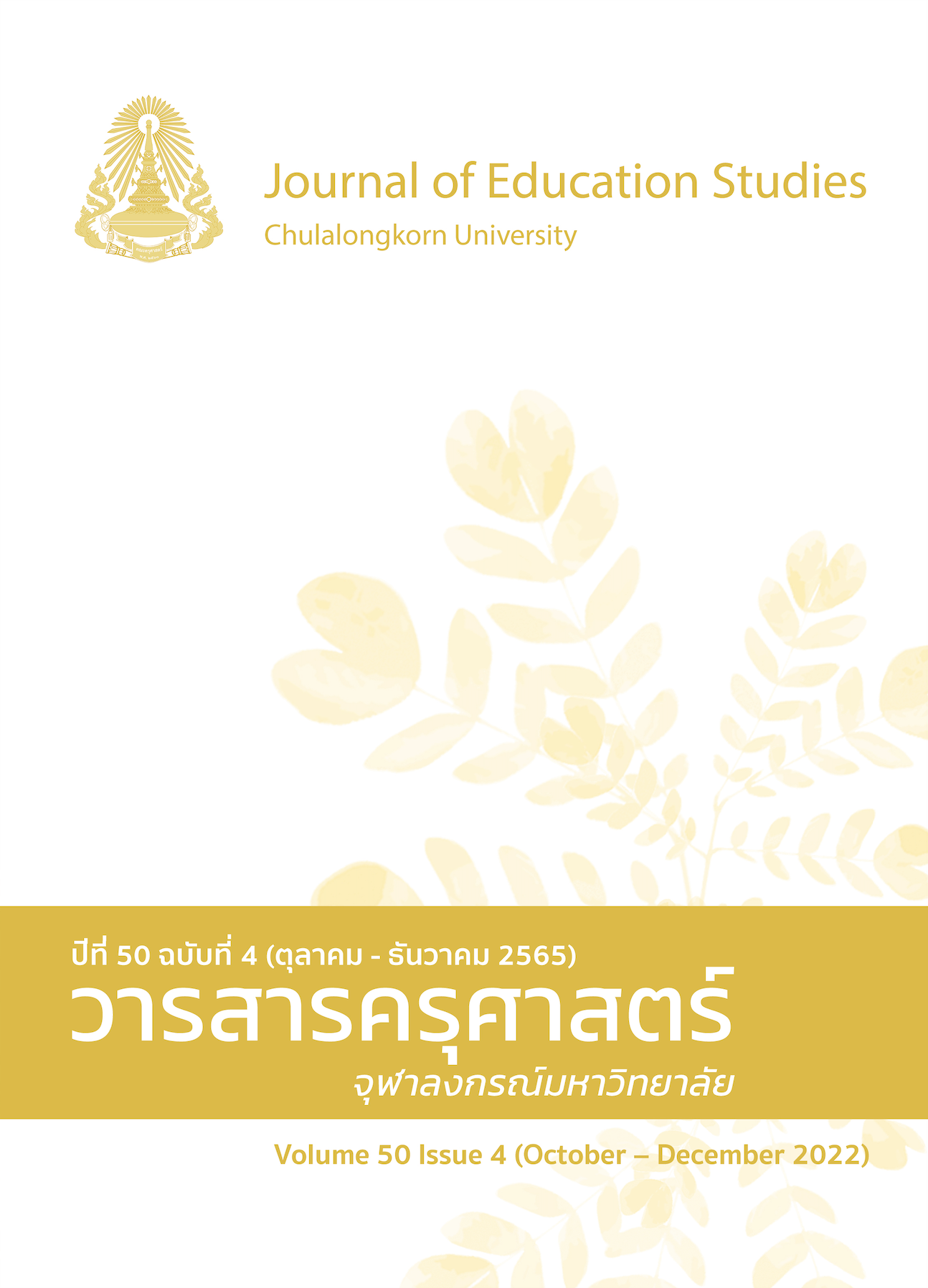Student Affairs Administration Strategies to Enhance Global Citizenship of Secondary School under The Secondary Educational Service Area Office Khon Kaen
DOI:
https://doi.org/10.14456/educu.2022.31Keywords:
strategies, student affairs administration, global citizenshipAbstract
This study aims to survey the current and desired conditions and requirements, as well as to present strategies, for student affairs administration promoting global citizenship. The samples include 79 school directors or deputy directors and 406 teachers from the Secondary Educational Service Area Office in Khon Kaen, for a total of 485 participants. Stratified random sampling was employed to collect the samples. The research instruments consisted of questionnaires with a reliability value of 0.901, and descriptive statistics were used to analyze the collected data and semi – structured Interview. The results indicate that the current status of student affairs administration for global citizenship is satisfactory, with an overall average score of 3.83. The average score of all desirable conditions for Student Affairs for Global Citizenship is 4.74, which represents the highest level. The greatest requirement of managing student affairs for global citizenship was community participation in developing global citizens (PNlModified = 0.305). In addition, the results demonstrated that strategies for student affairs services for global citizenship consist of four main strategies: (1) encouraging students to participate in school activities; (2) changing the paradigm for learners to reflect on their work; (3) solving problems corresponding to 21st century skills; and (4) creating a forum for local learning integration.
References
ภาษาไทย
กมลฤทัย เนตรทิพย์. (2564). การศึกษาสภาพการบริหารงานกิจกรรมนักเรียนแบบมีส่วนร่วมของโรงเรียนบ้านบ่อหลวง
อำเภอฮอด จังหวัดเชียงใหม่. บัณฑิตวิทยาลัย มหาวิทยาลัยรังสิต : การประชุมนำเสนอผลงานวิจัยบัณฑิตศึกษา
ระดับชาติ ครั้งที่ 16 ปีการศึกษา 2564. (431-440). ปทุมธานี.
กล้า ทองขาว. (2561). ยุทธศาสตร์ศึกษา – การจัดการศึกษาฐานชุมชน Community Based Education Management =
CBEM. วิทยาจารย์, 117(8), 45-48.
เกศนีย์ พิมพ์พก, ฤตินันท์ สมุทร์ทัย, สมศักดิ์ ภู่วิภาดาวรรธน์, และ เกียรติสุดา ศรีสุข. (2560). การพัฒนารูปแบบการนิเทศ
ติดตามและประเมินความสามารถในการวิจัย เพื่อพัฒนาการเรียนการสอนของนักศึกษาฝึกประสบการณ์วิชาชีพครู.
วารสาร มจร สังคมศาสตร์ปริทรรศน์, 6(3), 172-186.
ไกรศร วันละ. (2565). การมีส่วนร่วมของประชาชนในการพัฒนาชุมชนอย่างยั่งยืน. วารสารการบริหารนิติบุคคลและ
นวัตกรรมท้องถิ่น, 8(2), 391-404.
บัณฑิต นิจถาวร. (2563, 6 มกราคม). ปัญหาที่สังคมโลกและสังคมไทยรอคำตอบ. กรุงเทพธุรกิจ.
https://www.bangkokbiznews.com/social/860818
ประลอง ครุฑน้อย, สังวรณ์ งัดกระโทก, สมคิด พรมจุ้ย, และ สุพักตร์ พิบูลย์. (2563). การประยุกต์ใช้การประเมินที่ขับเคลื่อน
ด้วยทฤษฎีในการพัฒนาและประเมินโครงการพัฒนาบุคลิกภาพประชาธิปไตยของนักเรียนในโรงเรียน สังกัด
สำนักงานคณะกรรมการการศึกษาขั้นพื้นฐาน. วารสารศึกษาศาสตร์ มสธ., 13(1), 98-113.
เปรมวิทย์ ทองเชื้อ. (2564). ปัญหาการบริหารงานกิจการนักเรียนของสถานศึกษาสังกัดองค์กรปกครองส่วนท้องถิ่นในจังหวัด
นครสวรรค์. Education Journal, Faculty of Education, Nakhon Sawan Rajabhut University, 4(2),
-35.
พิณสุดา สิริธรังศรี. (2555). การศึกษาที่ฟังเสียงประชาชน. ใน การจัดการศึกษาแบบมีส่วนร่วมขององค์กรในชุมชน การศึกษา
ฐานรากทางเลือกประเทศไทย (น. 12-38). ศูนย์วิจัยและฝึกอบรมทางการศึกษา วิทยาลัยครุศาสตร์ มหาวิทยาลัย
ธุรกิจบัณฑิตย์.
มาเรียม นิลพันธุ์, ไชยยศ ไพวิทยศิริธรรม, ศิริวรรณ วณิชวัฒนวรชัย, และ อุบลวรรณ ส่งเสริม. (2558). การประเมินผลการใช้
หลักสูตรแกนกลางการศึกษาขั้นพื้นฐาน พุทธศักราช 2551 ในโรงเรียนต้นแบบการใช้หลักสูตร. วารสารศิลปากร
ศึกษาศาสตร์วิจัย, 7(1), 26-41.
วรากรณ์ สามโกเศศ. (2553). ข้อเสนอทางเลือกระบบการศึกษาที่เหมาะสมกับสุขภาวะคนไทย. สำนักงานกองทุนสนับสนุน
การสร้างเสริมสุขภาพ (สสส).
สถาพร พฤฑฒิกุล. (2558). การจัดการเรียนการสอนแบบ Active Learning เอกสารประกอบการฝึกอบรม “คุณภาพ
ผู้เรียน...เกิดจากกระบวนการเรียนรู้”. ม.ป.ท.
สมหมาย จันทร์เรือง (2559, 22 พฤศจิกายน). โรงเรียนประชาธิปไตย. มติชนออนไลน์.
https://www.matichon.co.th/columnists/news_366282
สำนักงานเลขาธิการสภาการศึกษา กระทรวงศึกษาธิการ. (2561). รายงานวิจัย ข้อเสนอตัวชี้วัดการศึกษาเพื่อความเป็น
พลเมืองโลก ตามกรอบเป้าหมายการพัฒนาที่ยั่งยืน (Sustainable Development Goal : SDG 4.7) : กรณีศึกษา
แนวทางการส่งเสริมความเป็นพลเมืองโลก (global citizenship) ประสบการณ์นานาชาติ. พริกหวานกราฟฟิค.
สำนักบริหารงานการมัธยมศึกษาตอนปลาย สำนักงานคณะกรรมการศึกษาขั้นพื้นฐาน กระทรวงศึกษาธิการ. (2552).
มาตรฐานการปฏิบัติงานโรงเรียนมัธยมศึกษา พ.ศ.2552. โรงพิมพ์สำนักงานพระพุทธศาสนาแห่งชาติ.
เสาวภาคย์ แหลมเพ็ชร. (2557). ยุทธศาสตร์การบริหารกิจการนักเรียนเพื่อประสิทธิผลการพัฒนาผู้เรียนในยุคสารสนเทศ.
สุทธิปริทัศน์, 28(87), 149-169.
อรรถพล อนันตวรสกุล. (2562, 13 กรกฎาคม). ความเป็นพลเมืองโลกกับคนรุ่นใหม่. sanook.
https://www.sanook.com/campus/1396293/
ภาษาอังกฤษ
Kniep, W. M. (1986). Social studies within a global educations. Social Education, 50(7), 536-542.
Krejcie, R. V., & Morgan, D. W. (1970). Determining sample size for research activities. Educational and
Psychological Measurement, 30(3), 607-610.
Mckinney, S. E. (2008). Developing teachers for high-poverty schools: The role of the internship
experience. Urban Education, 43(1), 68-82.
The Welsh Assembly Government. (2008). Education for sustainable development and global citizenship
a common understanding for schools. Department for Children, Education, Lifelong Learning and
Skills.
Downloads
Published
How to Cite
Issue
Section
License

This work is licensed under a Creative Commons Attribution-NonCommercial-NoDerivatives 4.0 International License.




